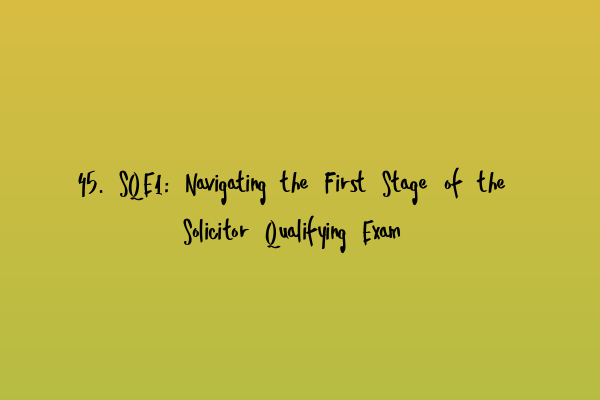45. SQE1: Navigating the First Stage of the Solicitor Qualifying Exam
Are you considering a career in law? Aspiring solicitors are all too familiar with the importance of qualifying exams for entering the legal profession. The Solicitor Qualifying Exam (SQE) has recently emerged as a new standardized assessment that every aspiring solicitor must navigate. In this article, we will break down the first stage of the SQE, known as SQE1, and provide you with valuable information to help you prepare for success.
Understanding the SQE1 Exam
The SQE1 exam is designed to evaluate candidates’ foundational legal knowledge and their ability to apply this knowledge effectively. The exam consists of two components: Functioning Legal Knowledge (FLK1) and Functioning Legal Knowledge (FLK2).
The FLK1 component assesses candidates’ understanding of the core legal principles in key practice areas, including Criminal Law, Constitutional Law, and Contract Law. It also covers topics such as Professional Conduct and Legal Research Skills. This component primarily tests candidates’ theoretical understanding of the law.
The FLK2 component evaluates candidates’ ability to apply their legal knowledge to practical scenarios. It assesses skills such as Legal Writing, Legal Drafting, Case Analysis, and Legal Problem Solving. This component aims to determine candidates’ readiness to enter the legal profession by evaluating their skillset in a real-world context.
Preparing for the SQE1 Exam
Proper preparation is essential to excel in the SQE1 exam. Here are some key steps to help you navigate this stage successfully:
- Understand the exam structure: Familiarize yourself with the exam structure, including the format, time allocation, and weightage of each component. This understanding will help you plan your preparation effectively.
- Develop a study plan: Create a study plan that covers all the topics and skills assessed in SQE1. Allocate sufficient time for each subject and prioritize areas where you need more practice or revision.
- Take advantage of prep courses: Enroll in SQE1 preparation courses that offer comprehensive coverage of the exam syllabus. These courses often provide study materials, practice quizzes, and mock exams to help you assess your progress and identify areas for improvement. Make sure to check out our SQE 1 Preparation Courses for an effective study program.
- Practice with exam-style questions: Acquaint yourself with the types of questions typically asked in the exam by practicing with SQE1 practice exam questions. These exercises will not only improve your understanding of the subject matter but also help you develop effective exam techniques.
- Take mock exams: Mock exams are invaluable for simulating the exam environment and assessing your readiness. Our SQE 1 Practice Mocks FLK1 FLK2 will give you the opportunity to gauge your performance and identify areas that require further attention.
- Stay updated with legal developments: The field of law is constantly evolving, so it is crucial to keep up with the latest legal developments and changes in legislation. Regularly read legal journals, court judgments, and professional blogs to stay informed and enhance your legal knowledge.
Familiarizing Yourself with Exam Dates
It is essential to plan your preparation according to the SQE1 exam dates. The SRA SQE Exam Dates will provide you with information about registration deadlines, exam windows, and result release dates. Keeping these dates in mind will help you stay on track and ensure that you complete your preparation in a timely manner.
Remember, success in the SQE1 exam requires dedication, hard work, and a comprehensive understanding of the exam structure and content. By following these preparation strategies, enrolling in effective courses, and accessing relevant resources, you can set yourself up for success in the first stage of the SQE. Good luck!
